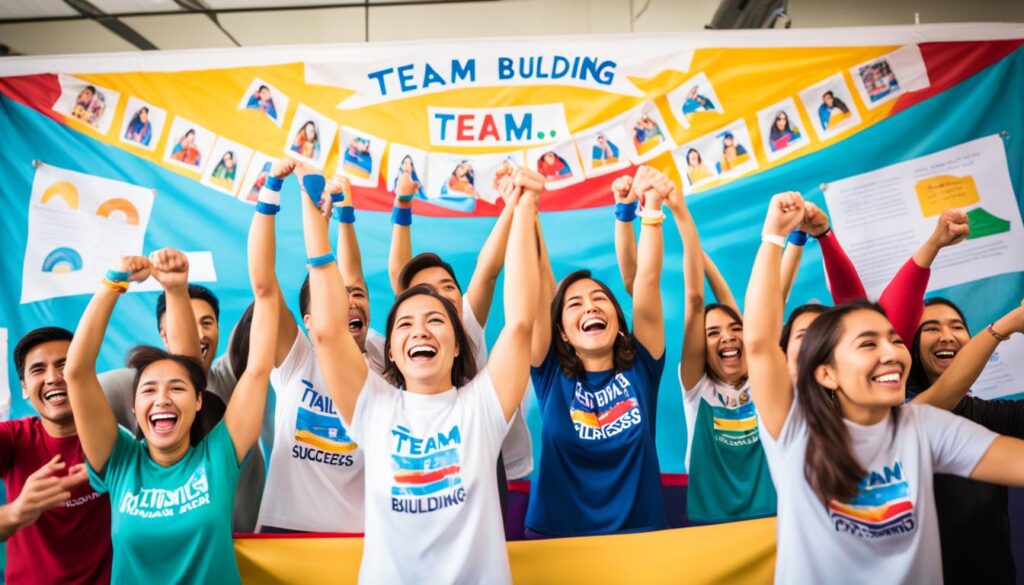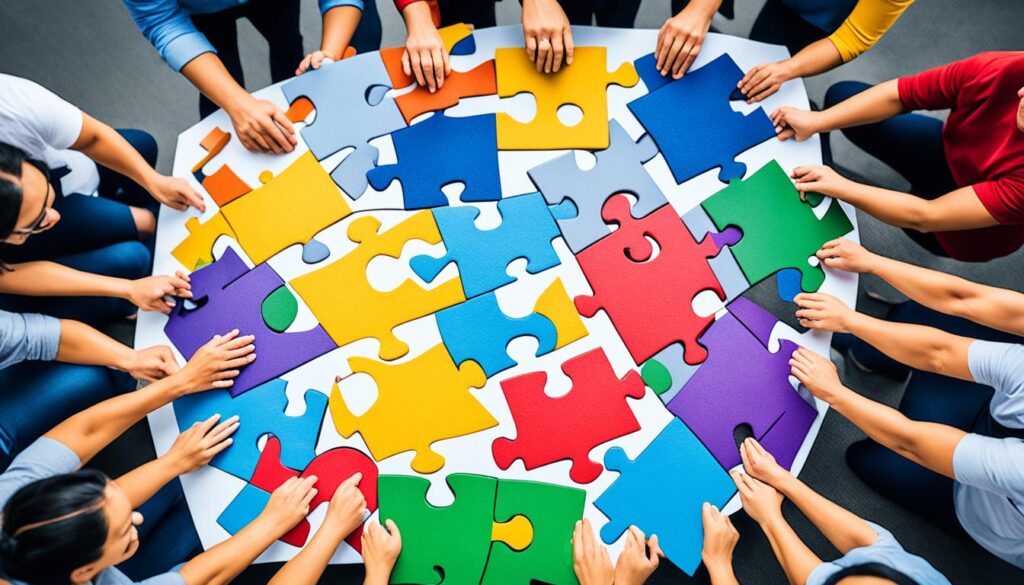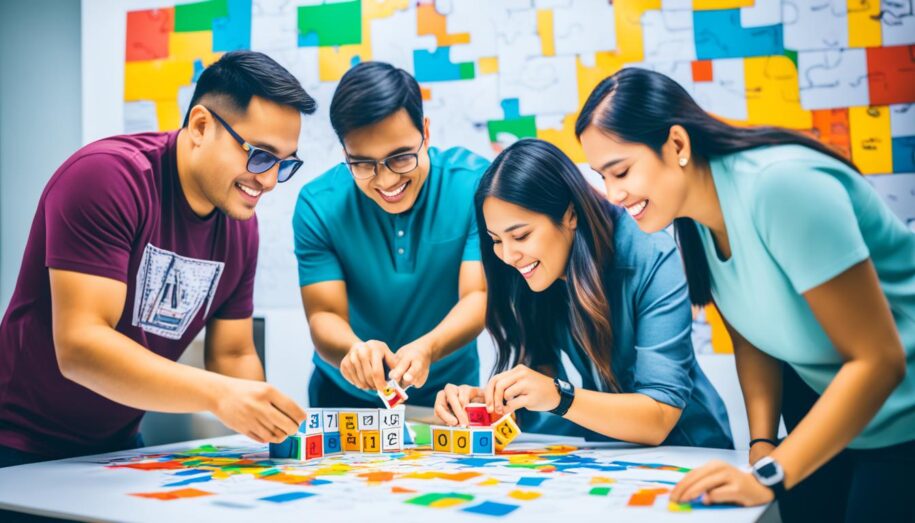Are you looking for innovative ways to enhance teamwork, communication, and problem-solving skills in your team? Incorporating fun mind games for team building can be the solution you’ve been searching for. These interactive activities not only break down barriers but also foster collaboration and transform groups into high-performing teams. So, are you ready to discover the power of mind games in boosting team dynamics?
Key Takeaways:
- Fun mind games can enhance communication, collaboration, and problem-solving skills among team members.
- These games break down barriers, build trust, and foster participation and laughter within teams.
- Mind games create a positive and engaging environment that transforms groups into cohesive and high-performing teams.
- Implementing the right mind games requires identifying appropriate games, fostering inclusivity, and facilitating effectively.
- Mind games offer key benefits such as enhancing team collaboration, fostering creativity and innovation, and improving communication skills.
The Role of Mind Games in Enhancing Team Dynamics
Mind games play a vital role in enhancing team dynamics by breaking down barriers, building trust, and promoting participation in team settings. When teams engage in interactive team-building exercises, they create an environment that encourages collaboration, communication, and laughter, leading to stronger bonds and improved teamwork.
Breaking Down Barriers with Two Truths and a Lie
One popular mind game for team building is Two Truths and a Lie. This game involves team members sharing two true statements about themselves and one false statement. The rest of the team then tries to guess which statement is the lie. By engaging in this game, team members get to know each other better, breaking down barriers and fostering a sense of camaraderie.
Building Trust Through Interactive Challenges
Interactive team-building exercises, such as the Marshmallow Challenge, are designed to foster trust among team members. In this challenge, teams are given limited materials and a time constraint to build the tallest structure using marshmallows and spaghetti. This exercise promotes collaboration, problem-solving, and creative thinking, while also building trust as team members rely on each other’s expertise and cooperation.
Encouraging Participation and Laughter in Team Settings
Promoting participation and laughter is crucial for creating a positive team environment. Team-building activities like group games and icebreakers provide opportunities for team members to engage actively and have fun together. These activities encourage open communication, boost morale, and create lasting memories that contribute to a cohesive team culture.
Strategies for Implementing Mind Games for Team Building
Implementing team-building games can be a powerful tool to enhance collaboration and strengthen team dynamics. However, it is essential to choose the appropriate games for your team and create an inclusive environment to maximize the benefits. Here are some strategies to consider:
Identifying the Appropriate Games for Your Team
When selecting team-building games, it’s crucial to consider the needs and preferences of your team members. Take into account their personalities, interests, and skill sets. Choose games that align with your team’s goals and objectives. For example, if you aim to improve communication skills, opt for games that promote active listening and effective articulation.
Setting the Stage: The Importance of Inclusive Team Building
Inclusive team building is vital for creating a sense of belonging and encouraging diverse participation. Ensure that the chosen games are accessible to all team members, regardless of their backgrounds or abilities. Consider cultural sensitivities, accessibility requirements, and individual comfort levels. By fostering inclusivity, you create a safe and supportive environment where every team member can contribute and thrive.
Guidelines for Facilitating Mind Games Effectively
Facilitating mind games requires effective guidance and facilitation. Here are some guidelines to enhance the facilitation process:
- Create a safe and supportive environment where team members feel comfortable expressing themselves.
- Set clear objectives for each game, ensuring that everyone understands the purpose and desired outcomes.
- Provide guidance and instructions to ensure that participants are aware of the rules and expectations.
- Offer constructive feedback throughout the game, highlighting strengths and areas for improvement.
- Encourage open communication and teamwork, fostering collaboration and problem-solving skills.
- Adapt the level of challenge to suit your team’s skills and abilities, ensuring an engaging and enjoyable experience.
- Ensure that the game duration is appropriate, allowing enough time for meaningful participation and reflection.
By implementing these strategies, you can create a positive and impactful team-building experience. Remember, the ultimate goal is to strengthen team dynamics, foster collaboration, and enhance individual skills to drive success and growth.

Key Benefits of Mind Games in Corporate Environments
Mind games in corporate environments offer several key benefits. They enhance team collaboration and foster a sense of belonging, which leads to improved productivity and employee satisfaction. These games also promote creativity and problem-solving skills, helping teams find innovative solutions to challenges. Additionally, mind games improve communication skills by encouraging active listening and effective articulation. Incorporating mind games into corporate environments can create a positive and supportive work culture.
Enhancing Team Collaboration
Mind games provide an interactive platform for teams to work together, fostering collaboration and synergy. By engaging in these games, team members learn to leverage their strengths, communicate effectively, and develop trust. This enhanced collaboration translates into higher-quality work, improved problem-solving, and increased innovation within the team.
Fostering Creativity and Problem-Solving
Mind games challenge team members to think creatively and find unique solutions to problems. These games encourage individuals to explore different perspectives, break free from conventional thinking, and push the boundaries of their imagination. By fostering creativity and problem-solving skills, mind games enable teams to tackle complex challenges with innovative strategies.
Improving Communication Skills
Mind games provide a fun and engaging platform for practicing and improving communication skills. They encourage active listening, where team members must pay attention to each other’s ideas and opinions. Additionally, mind games promote effective articulation, as participants need to express their thoughts clearly and concisely. By enhancing communication skills, these games facilitate better collaboration, reduce misunderstandings, and foster a more cohesive and productive work environment.
Creating a Positive Work Culture
By incorporating mind games into corporate environments, companies can create a positive and supportive work culture. These games promote employee engagement, boost morale, and create a sense of camaraderie among team members. The relaxed and enjoyable nature of mind games also helps to alleviate stress and create a more enjoyable work environment, leading to increased job satisfaction and employee retention.
| Benefits | Description |
|---|---|
| Enhanced Team Collaboration | Mind games foster collaboration, synergy, and trust within teams |
| Fostered Creativity and Problem-Solving | Encourages thinking outside the box and finding innovative solutions |
| Improved Communication Skills | Develops active listening and effective articulation among team members |
| Positive Work Culture | Creates a supportive and enjoyable work environment |
Mind Games for Team Building: Transforming Groups into Teams
Mind games for team building have the power to transform groups into cohesive and high-performing teams. These activities foster teamwork skills, encourage collaborative problem-solving, and build trust among team members. By engaging in fun and interactive mind games, groups can develop a sense of camaraderie and unity, leading to increased productivity and stronger team dynamics. Mind games provide a platform for team members to connect, communicate, and work together towards common goals.
Team-building activities involving mind games offer a unique opportunity for individuals to move beyond their roles as individuals and discover the strength and potential that lies within a team. Through these activities, team members learn to value each other’s strengths, complement their skills, and effectively work together to achieve shared objectives.
Developing teamwork skills is a critical component of transforming groups into high-functioning teams. Mind games provide an interactive and engaging way to foster collaboration, communication, and problem-solving skills. By participating in these activities, team members learn to listen actively, understand different perspectives, and effectively communicate their ideas.
“Teamwork is the ability to work together toward a common vision. The ability to direct individual accomplishments toward organizational objectives. It is the fuel that allows common people to attain uncommon results.” – Andrew Carnegie
Enhancing team cohesion is another vital aspect of transforming groups into effective teams. Mind games create an environment where team members can build trust, develop a sense of camaraderie, and establish stronger interpersonal connections. These activities break down communication barriers, promote open dialogue, and foster an atmosphere of mutual support and respect.

Developing Leadership Skills with Strategic Thinking Puzzles
Strategic thinking puzzles serve as effective leadership development activities for teams. By engaging in these puzzles, team members can enhance their decision-making skills, creative problem-solving abilities, and overall leadership expertise.
Puzzles That Challenge and Hone Decision-Making Abilities
Strategic thinking puzzles are specifically designed to challenge team members’ decision-making abilities. These puzzles require individuals to think critically and strategically, analyzing various options and their potential consequences. As team members navigate through these puzzles, they develop their decision-making skills by evaluating complex scenarios and making informed choices that lead to desired outcomes.
Leveraging Creative Approach in Puzzle Solving to Learn Leadership
Puzzles that foster creative problem-solving skills provide an opportunity for team members to think outside the box and develop innovative solutions. By approaching strategic thinking puzzles with a creative mindset, team members learn to explore different perspectives and apply unconventional strategies. This creative approach to puzzle solving facilitates the development of leadership skills such as adaptability, resilience, and out-of-the-box thinking.
Engaging in strategic thinking puzzles enables team members to strengthen their leadership abilities by honing their decision-making skills and fostering creative problem-solving. These activities provide a practical and engaging platform for team members to develop valuable leadership skills such as effective decision-making, adaptability, and resilience.
Enhancing Communication with Collaborative Gameplay
Collaborative gameplay can greatly enhance communication skills within teams. By engaging in interactive activities and games, team members have the opportunity to improve their active listening and articulation skills, becoming more effective communicators. These communication skills games provide a fun and engaging platform for team members to practice and develop their abilities in a supportive environment.
Improving Active Listening and Articulation Through Play
Active listening exercises are a valuable way to strengthen communication within teams. Games that focus on active listening challenge team members to listen attentively, process information, and respond effectively. These exercises encourage individuals to practice active listening skills by paying close attention to what others are saying and demonstrating their understanding. Through active listening exercises, team members can enhance their ability to communicate clearly and accurately, fostering better teamwork and collaboration.
Articulation activities are another crucial aspect of communication skills development. These games provide team members with opportunities to express their thoughts, ideas, and opinions confidently and clearly. Articulation activities can involve tasks such as presenting ideas, explaining concepts, or engaging in group discussions. By participating in these activities, team members can build their confidence and improve their ability to convey their thoughts and messages effectively.
Using Games to Break Down Complex Communication Barriers
Communication barriers can hinder effective collaboration within teams. Games offer an ideal way to break down these barriers and encourage open and honest dialogue among team members. By creating a relaxed and enjoyable atmosphere, games foster an environment that allows individuals to express themselves more freely. Through these games, team members can explore different communication styles, adapt to diverse perspectives, and develop strategies to overcome any barriers that may exist.
In addition to promoting open dialogue, games provide opportunities for teams to address complex communication barriers. These challenges can include language barriers, different communication preferences, or misunderstandings. By engaging in collaborative teamwork challenges, teams can work together to identify and address these barriers, finding innovative solutions and strengthening their overall communication skills.

Creative Thinking Exercises for Innovative Problem Solving
Creative thinking exercises are a valuable asset when it comes to fostering innovation and problem-solving skills within teams. These exercises inspire team members to think outside the box, explore different perspectives, and generate innovative solutions for complex challenges. By incorporating creative thinking exercises into team-building activities, teams have the opportunity to develop a culture of innovation and creativity. This, in turn, leads to enhanced problem-solving abilities and the ability to adapt to changing circumstances.
One such exercise involves brainstorming sessions where team members are encouraged to freely share ideas and build upon each other’s contributions. This exercise stimulates out-of-the-box thinking and enables teams to uncover unique and unconventional solutions to problems. Another effective exercise involves mind mapping, which allows teams to visually organize their thoughts and explore various connections and associations. Through mind mapping, teams can identify alternative perspectives and identify potential solutions that may have been overlooked.
Furthermore, role-playing exercises can be a powerful tool for fostering creativity and innovation within teams. By taking on different roles and embodying various personas, team members can approach problem-solving from different perspectives, leading to fresh insights and breakthrough ideas. This exercise challenges team members to think creatively and pushes them to explore uncharted territories.
Integrating creative thinking exercises into team-building activities not only fosters a culture of innovation but also cultivates a mindset that embraces unconventional approaches to problem-solving. By encouraging teams to think creatively, explore different perspectives, and generate innovative ideas, organizations can empower their teams to find effective solutions to complex challenges.
Incorporating Filipino Culture in Group Bonding Games
Team bonding activities that incorporate elements of Filipino culture can be a great way to create a sense of familiarity and connection among team members in the Philippines. By infusing traditional Filipino games into team-building exercises, companies can foster a deeper level of engagement and strengthen relationships within their teams.
Local Filipino Games That Resonate with Team Members
Traditional Filipino games such as patintero, luksong tinik, and tinikling hold a special place in the hearts of Filipinos. These games have been passed down from generation to generation and are deeply rooted in the country’s rich cultural heritage. Incorporating these games into team bonding activities not only adds a fun and nostalgic element but also creates an opportunity for team members to reconnect with their cultural roots.
Patintero is a game that involves two teams trying to cross the opposing team’s territory without being tagged. Luksong tinik, on the other hand, requires players to jump over bamboo sticks without touching them. Tinikling is a traditional folk dance where participants step over and between bamboo poles while dancers rhythmically move and time their steps. By including these games in team-building activities, companies can evoke a sense of pride and create a memorable experience for their Filipino employees.
Cultural Sensitivity: Adapting Games to Filipinos in the Workplace
When incorporating Filipino culture into team bonding games, it is crucial to be culturally sensitive and considerate of the preferences and values of Filipino employees. Cultural sensitivity means adapting and modifying the games to make them inclusive and enjoyable for everyone. This can involve adjusting the rules or formats to be more inclusive or incorporating elements that resonate with the local culture. By doing so, companies can create an environment that values diversity and promotes a sense of belonging among their Filipino team members.
Adapting games to Filipino employees also means taking into account their cultural nuances and understanding how certain activities may be perceived. For example, some games that involve physical contact may be more suitable for teams that have known each other for a longer time, while others may prefer more non-contact activities. By showing cultural sensitivity and being mindful of these differences, companies can ensure that team bonding activities are enjoyable and comfortable for everyone involved.

Conclusion
Incorporating fun mind games into team-building activities can have a significant impact on team dynamics, communication, problem-solving abilities, and overall team cohesion. These games provide an engaging and interactive platform for team members to connect, collaborate, and develop crucial skills. By breaking down barriers and fostering creativity and leadership, mind games offer numerous benefits for teams in corporate environments.
When team members engage in mind games, they not only strengthen their communication skills but also enhance their problem-solving abilities. The interactive nature of these games encourages active participation and creates a positive and supportive work culture. Through laughter and shared experiences, teams develop stronger bonds, leading to improved teamwork and increased productivity.
By embracing the power of mind games, companies can create a positive and productive work culture, driving success and growth. Incorporating these games into team-building initiatives fosters a sense of belonging and encourages collaboration, ultimately transforming groups into cohesive and high-performing teams. So, start implementing mind games in your team-building activities and reap the numerous benefits they offer in enhancing team dynamics, communication, and problem-solving skills.
FAQ
What is the role of mind games in enhancing team dynamics?
Mind games break down barriers, build trust, and encourage participation and laughter within team settings, ultimately transforming groups into cohesive and high-performing teams.
How can I identify the appropriate mind games for my team?
Identifying the right games involves assessing the needs and preferences of your team members. Inclusive team building is crucial, as it creates a sense of belonging and encourages diverse participation.
What are some strategies for facilitating mind games effectively?
Effective facilitation involves creating a safe and supportive environment, setting clear objectives, and providing guidance and feedback throughout the process.
What are the key benefits of mind games in corporate environments?
Mind games enhance team collaboration, foster a sense of belonging, promote creativity and problem-solving skills, and improve communication skills within teams.
How do mind games transform groups into teams?
Mind games foster teamwork skills, encourage collaborative problem-solving, and build trust among team members, leading to increased productivity and stronger team dynamics.
How can strategic thinking puzzles develop leadership skills within teams?
Strategic thinking puzzles challenge decision-making abilities and encourage creative problem-solving, helping team members develop effective leadership skills.
How do collaborative gameplay activities enhance communication skills?
Collaborative gameplay activities focus on improving active listening and articulation, helping team members become better communicators and break down complex communication barriers.
What benefits do creative thinking exercises bring to team problem-solving?
Creative thinking exercises foster innovation and encourage team members to think outside the box, leading to improved problem-solving abilities and adaptability.
How can I incorporate Filipino culture in group bonding games?
By adapting traditional Filipino games for team-building activities, you can create a sense of familiarity and connection among team members in the Philippines, fostering positive relationships and a deeper sense of belonging.
Are there any success stories of companies using mind games for team building in the Philippines?
Yes, there are several case studies highlighting how various organizations in the Philippines have successfully implemented mind games to enhance team dynamics, improve communication, and boost overall team performance.
